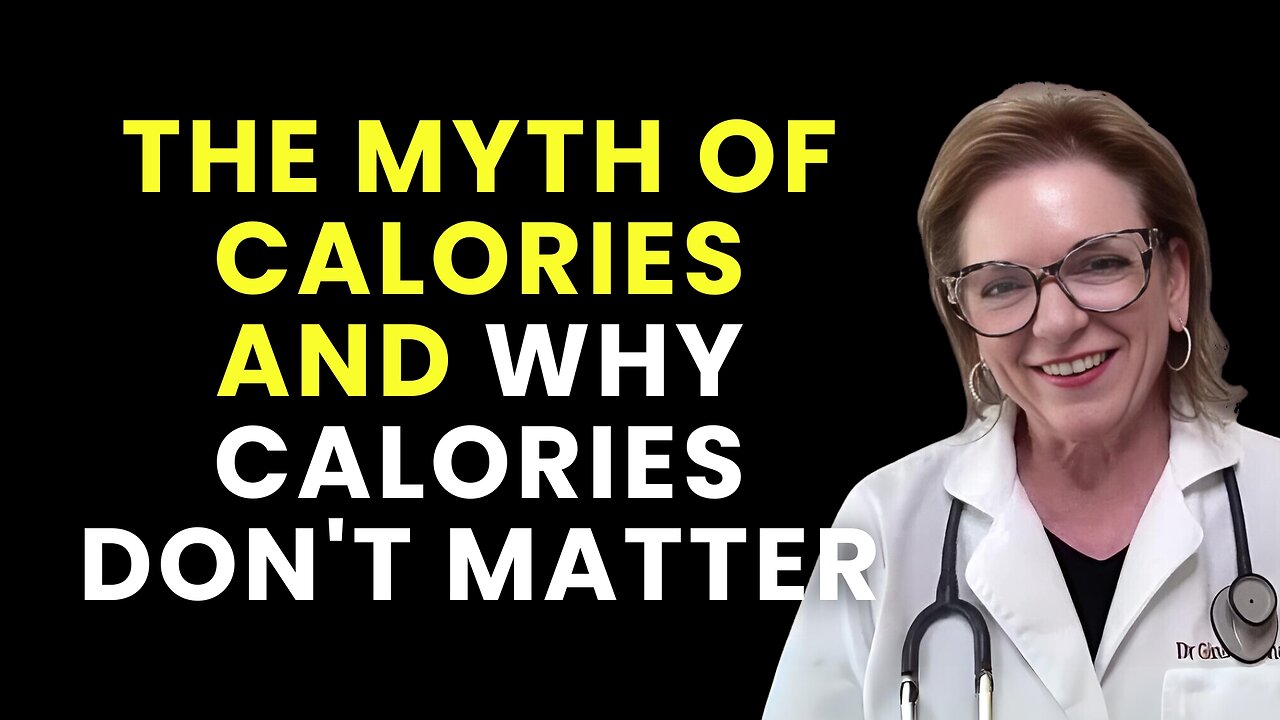Premium Only Content

The Myth of Calories and Why Calories Don't Matter
In this enlightening video, host Andrew Anderson engages with Dr. Gina Pritchard to unravel the persistent myth surrounding calorie counting and to explain why calories don't matter as much as popularly believed. Drawing from Andrew’s over a decade-long experience with the keto diet, they debunk the traditional notions about calories being the primary metric for weight loss or health maintenance. They point out that numerous studies have demonstrated the fallacy of calorie measurement and argue that equating calories from different sources, like fats, proteins, and carbohydrates, is misleading. Dr. Pritchard emphasizes that our bodies respond to different types of foods in varied ways, and caloric intake doesn't provide a complete picture of dietary health.
During the discussion, Andrew uses the analogy that comparing the caloric impact of various substances, like tequila and beer, doesn't account for the different effects they have on the body. Dr. Pritchard elaborates, stressing that calories in versus calories out oversimplifies the complex science of energy metabolism. She advocates for cancelling the calorie conversation entirely, explaining how the body’s energy use is much more complex, involving cellular functions and energy sources like glucose and insulin. The discussion highlights that extreme caloric restriction can lead to counterproductive results, such as a slowdown in metabolic processes and fat preservation by the body, contrary to the traditional view that less caloric intake results in weight loss.
Instead, both Andrew and Dr. Pritchard recommend focusing on the quality of food — particularly proteins and fats — and adopting methods like intermittent fasting. They explain how intermittent fasting differs from mere caloric restriction, promoting cellular health and longevity through processes like autophagy, which the body undergoes during fasting periods. According to Dr. Pritchard, this process helps in eliminating inefficient 'zombie cells' and supports overall metabolic efficiency. The duo also touches on the efficiency of ketones as an energy source compared to glucose. Ketones provide a more sustainable and productive form of energy, enhancing brain and heart functions, and leading to a state Dr. Pritchard describes as a 'lean mean fat-burning machine.'
Throughout their 10-minute conversation, Andrew and Dr. Pritchard also discuss how hormonal imbalances related to diet can affect feelings of fullness and overall satiety. When individuals switch to a healthier diet, such as keto, their bodies start to reset, and hormone receptors gradually return to a state where they can accurately signal fullness. This adjustment leads to more effective and natural weight management without the need to count calories. They emphasize that understanding the type of food consumed is critical for health improvements and that when the body is properly fueled with quality nutrients, it does not make mistakes in managing energy efficiently.
The discussion then transitions to how intermittent fasting and a ketogenic diet can be implemented effectively. Dr. Pritchard explains that by consuming high-quality proteins and fats, individuals can experience substantial improvements in cognitive focus and physical performance. Intermittent fasting aids in this process by creating eating windows that promote efficient energy use and cellular cleanup. They further highlight the importance of community support and education in transitioning to and maintaining healthier lifestyles. Dr. Pritchard notes that seeing others successfully living this lifestyle can be highly motivational, encouraging those new to the approach to persist and seek support when needed. The importance of education and community is underscored as key elements in making lasting lifestyle changes.
Towards the end, Dr. Pritchard shares where viewers can find more information, including her websites ThePreventClinic.com and SkipYourNextHeartAttack.com. They also introduce The Spit Test, which helps monitor the oral microbiome, an often-overlooked aspect of health connected to the gut biome. Monitoring and maintaining a healthy oral microbiome can have significant implications for overall health. In conclusion, they drive home the transformative potential of ketogenic diets combined with intermittent fasting, encouraging viewers to move beyond outdated calorie myths for better physical and mental well-being. The video wraps up with Andrew expressing his gratitude for Dr. Pritchard’s insights and highlighting the impact these practices have had on his own life.
00:37 Debunking the Calorie Myth
01:44 The Flaws of Calorie Restriction
05:07 Intermittent Fasting vs. Calorie Counting
06:41 Benefits of Ketosis and Intermittent Fasting
08:08 Community Support and Resources
08:46 Conclusion and Contact Information
-
 0:42
0:42
The Longer Crowbar
1 month agoThin and Fit Doesn’t Mean Heart-Safe!
201 -
 9:58
9:58
Clintonjaws
12 days ago $0.11 earnedKaroline Leavitt's Response To 'The View' Host's Nasty Attacks Is Perfect
12.2K13 -
 24:23
24:23
World2Briggs
19 hours ago $0.01 earnedTop 10 Towns You Can Retire on $1900 a month in the Pacific North West.
18.6K8 -
 21:23
21:23
Lady Decade
16 hours ago $0.03 earnedThe Lost Sega Neptune Console Refuses To Die !
14.3K4 -
 17:14
17:14
ThinkStory
22 hours agoIT: WELCOME TO DERRY Episode 2 Breakdown, Theories, & Details You Missed!
13.2K -
 17:25
17:25
Real Estate
1 month agoThe Job Market Collapse IS HERE
14.7K12 -
 2:04:54
2:04:54
BEK TV
1 day agoTrent Loos in the Morning - 11/05/2025
11.6K1 -
 LIVE
LIVE
The Bubba Army
23 hours agoUPS PLANE EXPLODES - What Went Wrong? - Bubba the Love Sponge® Show | 11/05/25
1,137 watching -
 16:38
16:38
James Klüg
21 hours agoFOOD STAMPS RAN OUT, Will People Loot?
26K36 -
 23:56
23:56
Producer Michael
19 hours agoBuying My Wife a $500,000 Diamond Necklace!
17.8K11